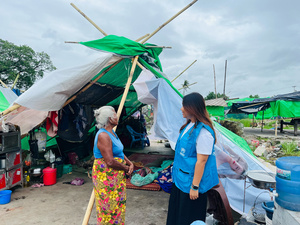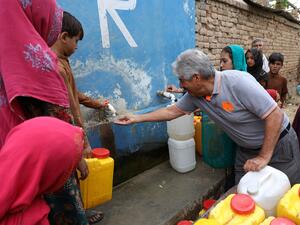UNHCR works with Pakistani partners to extend reach of quake relief effort
UNHCR works with Pakistani partners to extend reach of quake relief effort

UNHCR has provided 550 tents to help a local Pakistan NGO set up the new Thori Park camp on the banks of the Jhelum river in Pakistan-administered Kashmir.
MUZZAFARABAD, Pakistan, October 28 (UNHCR) - Its name means 'little' in Urdu, but the Thori Park camp in Muzaffarabad will soon be one of the largest emergency settlements in Pakistan-administered Kashmir.
The UN refugee agency has provided the Pakistani charitable group that is constructing the camp with 550 of the 600 tents which are being placed on the site. Each tent will be able to accommodate one family.
The camp is located on the bank of the Jhelum River at the bottom of a steep valley. A dirt road leads to Muzaffarabad's state assembly building which has become a hub for incoming United Nations relief supplies.
Hanif Hijazi, and eight other volunteers of the Al Mustafa Welfare Society, arrived in Muzaffarabad from their homes in Kotli, 200 kilometres away, on the same day the quake struck. Today the group has more than 400 volunteers working in Muzaffarabad, having arrived here from across Pakistan.
At Thori Park a dozen men are working to erect the hundreds of tents they have received. With each UNHCR family tent weighing between 40 and 50 kilogrammes, it's an exhausting job.
"We were so relieved when UNHCR offered to support our camp," says Hajazi. "Immediately after the quake we were able to get our hands on a few locally manufactured tents, but they were poor quality. The tents we're receiving from UNHCR are much stronger and will provide adequate shelter for the families over the winter."
Al Mustafa is just one of the charities UNHCR is working with in Pakistan-administered Kashmir, in the effort to deliver shelter supplies such as tents, blankets, and plastic sheets to survivors of the devastating October 8 earthquake that left more than 53,000 people dead and more than 75,000 injured.
"We have three main objectives in this area," says Urooj Saifi, UNHCR's team leader in Muzaffarabad. "We want to improve the conditions in many of the camps which sprung up in the immediate aftermath of the quake. With the Pakistani authorities, we're working to identify areas where more formal camps can be established. And we want to create camps away from the main centres so that people living in the higher altitudes have a shorter distance to travel to find shelter."
UNHCR recently delivered 300 tents to Al Mustafa teams working in the town of Hattian Bala, 35 kilometres from Muzaffarabad. Until earlier this week, the town had remained cut off by the many landslides that blocked the roads. Traffic is still frequently stopped as the Pakistani military uses explosives to clear boulders. Temporary metal spans have been laid over collapsed bridges.
Asif, an engineer for a local government ministry, joined a group of men in unloading the tents. The trucks that have brought them from UNHCR's warehouse in Islamabad are too big to navigate the narrow track that leads to the camp site and the supplies must be reloaded onto smaller vehicles.
"Until a couple of days ago, we had received nothing here," says Asif. "My family's house completely collapsed and we had to sleep on the open ground. But even after the quake people don't want to leave this place."
From its regional base in Muzaffarabad, UNHCR has distributed 1,800 tents, 5,000 blankets and thousands of plastic sheets, stoves and other supplies. Elsewhere in the quake zone UN refugee agency teams are working with the Pakistani military to set up and support camps for quake survivors.
A NATO/UNHCR airlift of supplies from the agency's warehouse in Turkey is bringing additional life-saving assistance to Islamabad's Chaklala air base every day.
As part of the joint UN relief operation, UNHCR is supplying some 20,000 tents as well as nearly a quarter of a million blankets and other relief items to assist survivors in weathering the approaching winter.
By Tim Irwin in Muzaffarabad, Pakistan









